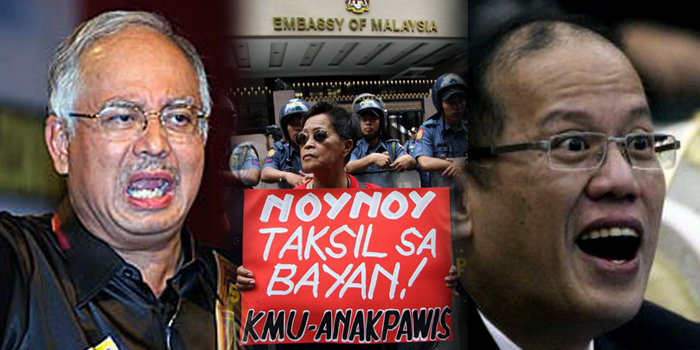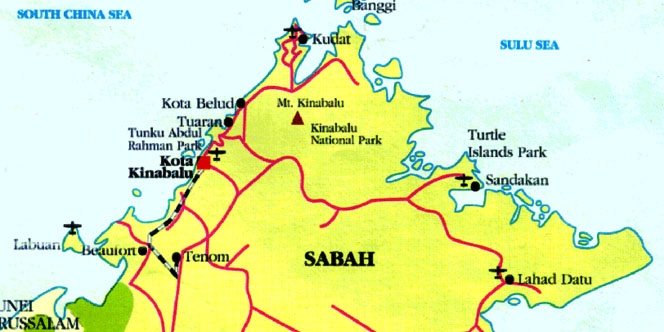Sabah crisis: Is Aquino siding with Malaysia to protect relatives’ business interests?
The “journey home” to Sabah of some 200 followers of the Sultanate of Sulu more than a month ago has escalated into a full blown humanitarian crisis. More than a thousand Filipinos have fled Sabah that for decades they called home. Men, women and children took any boat available in a frantic and perilous voyage […]


The “journey home” to Sabah of some 200 followers of the Sultanate of Sulu more than a month ago has escalated into a full blown humanitarian crisis. More than a thousand Filipinos have fled Sabah that for decades they called home. Men, women and children took any boat available in a frantic and perilous voyage away from the brutality of Malaysian forces. The number of refugees in Tawi-Tawi from Lahad Datu and other affected towns in Sabah is expected to grow in the coming days.
Those who fled recounted the atrocities that Filipinos suffered in the disputed territory. “Malaysian policemen ordered Filipino men to run as fast as they could and shot them,” said a report by the Philippine Daily Inquirer. “Even pregnant women and children have been hunted down and killed as the Malaysians fire mortars and embark on a house-to-house search,” according to the Philippine Star. These people are not part of the armed followers of Sultan Jamalul Kiram III. They just happen to be Filipinos.
Some are baffled while most are enraged by the attitude of the Aquino administration towards the Sabah crisis. From the onset, President Benigno Aquino III took a hardline stance against the Sulu royal forces. Jamalul’s brother Rajah Mudah Agbimuddin Kiram and his men must surrender before any talks can happen, Aquino insisted. Charges are being prepared versus the Kirams, claimed the Justice department. They may also be turned over to Malaysian authorities to face prosecution. Malacañang sowed intrigues to cast doubt on the motive and legitimacy of the Sultanate. The National Bureau of Investigation (NBI) is probing the alleged conspiracy between the Kirams and certain politicians. All these even as Aquino ignored appeals by the Sultanate and the United Nations (UN) to stop the Malaysian military assault and for parties to talk.

Palace and Foreign Affairs spokespersons, of course, expressed concern over the reported human rights abuses in Sabah. But their statements are meaningless amid the brutal military offensive launched by Prime Minister Najib Abdul Razak that Aquino practically sanctioned with his reckless position. The public perception is that Aquino abandoned his own people, surrendered the country’s rightful claim to Sabah and sided with Malaysia. Thus Aquino, like Prime Minister Najib Abdul Razak and his forces, is responsible for the carnage of Filipino men, women and children in Sabah.
But why is Aquino siding with Malaysia? One plausible explanation noted by analysts is the ongoing peace talks with the Moro Islamic Liberation Front (MILF) where Malaysia plays a key role as facilitator. Aquino does not want to displease Malaysia and risk undermining the negotiations.
However, it is also notable that since taking over in 2010, Aquino’s relatives who bankrolled his presidential bid have inked business deals with Malaysia. Could these business interests be another possible explanation for the administration’s handling of the Sabah crisis?
What are these business deals? One involves San Miguel Corporation (SMC) of Aquino’s uncle Eduardo “Danding” Cojuangco Jr. In August 2011, SMC acquired three subsidiaries of US oil giant Exxon Mobil’s downstream oil business in Malaysia. Worth $610 million, the transaction included the purchase by SMC of Esso Malaysia Bhd, Exxon Mobil Malaysia Sdn Bhd and Exxon Mobil Borneo Sdn Bhd. In its website, SMC said that the three companies form an integrated business engaged in refining, distribution and marketing of petroleum products. The physical assets include the 88,000 barrels per day Port Dickson refinery; seven fuel distribution terminals; and about 560 refilling stations.
SMC’s entry into the Malaysian downstream oil industry could be just the initial steps. Ramon S. Ang, president of the giant conglomerate, recently disclosed that SMC is eyeing big oil and natural gas field overseas. “If we were able to buy one of those, it would be like printing money forever,” Ang was quoted as saying. SMC is so serious about the plan that Ang said they are willing to let go of longtime core business San Miguel Brewery Inc. and new assets in power generation to raise funds. With its acquisition of Exxon Mobil’s downstream assets, SMC is in a strategic position to also corner upstream deals in oil-rich Malaysia.
The disputed state of Sabah itself is abundant in oil and gas resources. An article by the Philippine Star, quoting a 2012 study by Singapore-based FACTS Global Energy, reported that Sabah has reserves of about 11-12 trillion cubic feet of gas and at least 1.5 billion barrels of oil. The figures represent 12% and 15% of Malaysia’s natural gas and oil reserves, respectively, according to the report. Another article, by the Centre for Research on Globalization, noted that Sabah has 15 oil wells that can produce as many as 192,000 barrels a day. Also, four new oil fields have been discovered in its territorial waters in the past two years further increasing Sabah’s potential as oil producer.
Is Aquino avoiding displeasing Malaysia over the Sabah dispute so as not to undermine the grand multibillion dollar oil and gas ambitions of SMC and uncle Danding?
Another business deal involves AirAsia Philippines, the local affiliate of Malaysia-based AirAsia Bhd, the largest budget carrier in Southeast Asia. In November 2010, the Board of Investments (BOI) approved the formation of AirAsia Philippines as a joint venture between Malaysian investors and Filipino businessmen led by the President’s cousin Antonio “Tonyboy” Cojuangco Jr. Tonyboy and his Malaysian partners are aggressively expanding their operation in the Philippines with their recent acquisition of at least a 40% stake in local rival Zest Airways Inc.
Does Aquino fear that the contentious Sabah issue could somehow complicate the blooming Malaysian business partnership of his cousin Tonyboy?
Aquino could not just ignore the interests of his rich relatives. He won’t be President without their vital support.
Tonyboy was the biggest campaign donor of Aquino in 2010, based on the President’s official declaration to the Commission on Elections (Comelec). Out of the P440 million in campaign funds declared by Aquino, Tonyboy’s contribution accounted for almost a quarter with P100 million. While Danding was not officially listed as a campaign donor, it is widely believed that the tycoon and Marcos crony also supported the candidacy of his nephew.
If these business interests of his relatives played a key role in Aquino’s handling of the crisis, then the slaughter of our men, women and children in Sabah becomes much more revolting and enraging than it already is.
The author is a Filipino activist, writer, and researcher. The article first came out in his blog.

